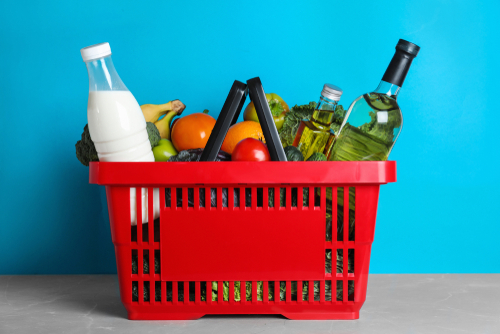The Food and Drink Federation (FDF) claims government policies including extended producer responsibility (EPR) for packaging will lead to higher food prices for consumers.
In a report published last week assessing the impact of seven different policies, the FDF claimed the price of food and drink shopping per household would increase by more than £160 per year if costs were passed on.
However, Defra responded by saying that the policies were designed in a way which encouraged producers to reduce the amount of material they used, “in a way which doesn’t pass on costs to the consumer”.
Costs
The FDF is a membership organisation which represents UK food and drink manufacturers. Its members include a range of companies and trade associations, from large multinationals such as Mars and Unilever to smaller companies as well.
The FDF says EPR will result in £1.7 billion in additional costs, while the deposit return scheme (DRS) for food and drink packaging will result in an additional £850 million, and the introduction of promotional restrictions on foods high in fat, sugar or salt £833 million.
Food and drink manufacturers have worked “tirelessly” to absorb increases in the cost of raw materials during the last 20 years, the FDF says. The membership organisation claims there is “no margin left” to offset the “costly” policies, meaning manufacturers will pass the costs on directly to consumers.
The membership organisation also suggested poorer socio-economic households would see their shopping bills increase by 11%.
The FDF called on the government to reconsider the policies and their “unintended consequences”.
Pressing concerns
Ian Wright CBE is the FDF’s chief executive. While he welcomed the intent of the policies, he questioned whether the government properly understood their impact.
In a statement, he said: “We absolutely accept the need to address the pressing concerns around sustainability and obesity. Our members are doing so on an epic scale through active commitments to net zero and reformulation. The government needs to understand the costs of the changes it is demanding and the impact it would have on the cost of household food and drink shopping.”
“The government needs to understand the costs of the changes it is demanding and the impact it would have on the cost of household food and drink shopping”
He added: “The UK enjoys a fantastic range of food and drink at a range of price-points. Our industry has done an incredible job of keeping that cost low for the last three decades. But that period is now at an end. Double digit percentage increases in food expenditure for the poorest households are highly likely in the coming years unless the government pauses to the consider the consequences of its plans.”
Responsibility
In response, a spokesperson for the Department for Environment, Food and Rural Affairs (Defra) told letsrecycle.com that by placing more responsibility on brands and manufacturers to use more recyclable packaging, businesses and consumers could recycle their packaging waste “more easily”, with less going to landfill or energy from waste.
The spokesperson also noted that local authorities currently pay for the collection and management of drinks containers and household packaging waste, “funded by taxpayers”.
The spokesperson said: “The aim of our EPR proposals is to ensure businesses take responsibility for the packaging they use along with the associated costs of dealing with packaging at the end of its life. These proposals encourage industry to reduce the amount of material they use and increase the use of recyclable and reusable alternatives in a way which doesn’t pass on costs to the consumer whilst protecting our precious environment.
“This will ensure we recycle and reuse more of our waste and resources, which is central to our ambition to leave the environment in a better state for future generations.”
Defra said it wanted to introduce EPR as soon as it was “practicable”. The government department says it is currently analysing the feedback it received through its consultation on EPR and would publish its response “in due course”.
EPR
Ministers plan to introduce EPR from 2023 under provisions contained within the environment bill.

EPR will introduce the principle of ‘full net cost recovery’, making producers responsible for the full costs of an efficient system for managing packaging waste. Collection, sorting and recycling are all covered, net of the value of the materials collected.
Defra estimates producers will pay annual costs in the region of £2.7 billion in the first full year of the scheme’s implementation. This is made up of £1 billion for packaging waste collected from households, £1.5 billion for packaging waste collected from businesses, and £200 million for the management of bin and ground packaging litter.
Producers’ fees will be modulated, meaning those who use so-called unrecyclable packaging such as polystyrene or black plastic will be required to pay more.
In a report published in late May, compliance specialist Valpak estimated that EPR could cause the cost associated with an average shopping basket of goods to rise by up to 0.6% (see letsrecycle.com story). The total cost of EPR across a year could add up to as much as £100 per household when the total costs outlined by the four governments are divided by the number of households in the UK, Valpak claimed.
In June, organisations including the Packaging Federation and the TaxPayers’ Alliance expressed concerns around EPR and rising consumer costs (see letsrecycle.com story).
Related link
Eating into household budgets: the Government’s recipe for food price inflation
The post EPR could mean higher food prices for consumers appeared first on letsrecycle.com.
Source: letsrecycle.com Packaging


